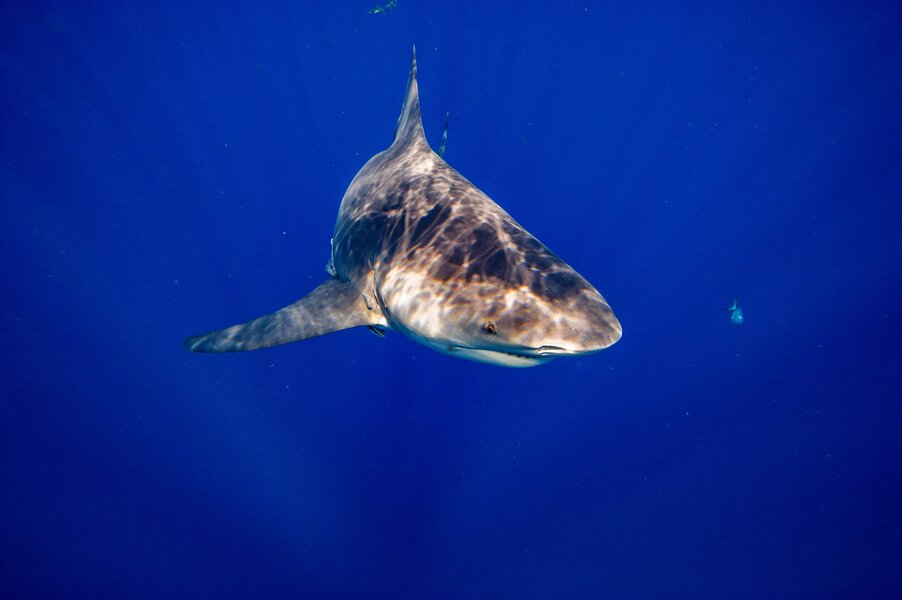Travel
What to Know About Shark Attacks While Traveling

In the span of just less than two hours, three people suffered shark attacks in less than a four-mile radius on Florida’s Gulf Coast on June 7. The attacks were two separate incidents, and no one was killed, but one teenage girl required her hand and part of her left leg to be amputated following her injuries. These attacks have unsurprisingly quelled new panic around shark attacks. Even though there’s been a ton of progress since the days of Jaws to dispel the myth that sharks are hunting humans, when incidents like the ones that occurred in Walton County make headlines, some of that same paranoia can permeate conversations.
In 2023, there were only 120 total shark-human interactions worldwide. In the US, there were 36 incidents and two fatalities. Meanwhile, humans kill 80 million sharks per year, and 25 million of those sharks are a threatened species. In the Shark-Human dynamic, the finned animals aren’t the most dangerous. For a reality check, Dr. Catherine Macdonald, the director of the Shark Research and Conservation Program at the University of Miami, broke down some of the most important information the public needs to know about sharks, shark attacks, and beach safety.
Sharks don’t want to bite people
Of the 120 shark-human incidents in 2023, 22 of the bites were “provoked bites,” which “occur when a human initiates interaction with a shark in some way,” according to the International Shark Attack File. “Unprovoked bites” accounted for 69 bites, which are incidents where “a bite on a live human occurs in the shark’s natural habitat with no human provocation of the shark.”
In this second scenario, Dr. Macdonald says sharks aren’t seeking out people to bite. “Sharks don’t bite people as a matter of preference,” Macdonald explains. “And if they did, we wouldn’t be safe in any ocean.”
When it comes to Florida and the increased instances of shark attacks in the state, it comes down to probability. “Florida gets this reputation as the shark bite capital of the world,” she continues. “That reputation comes from two things. We have a lot of sharks. We have a lot of coastline. Our waters are hospitable to them. We have a lot of beaches. We have a large human population and a large tourist population that want to be at those beaches and in the water. And our water is warm enough that you can be in it year round and that people visit beaches year round.”
How can you avoid shark attacks?
“If you’re in the ocean, you’re in waters that are home to sharks,” Macdonald says. “So if you are not comfortable with that, there are some great solutions including swimming pools for a guaranteed shark-free water experience.”
But, if you, like millions of Americans, plan on wading into the ocean as part of your summer adventures, there are some simple, common-sense approaches you can take to your time in the ocean that will reduce the likelihood of encountering sharks in their natural habitats. Here’s what Macdonald advises:
- “Swim in clear, shallow water.”
- “Don’t swim in schools of bait fish. You’re much more likely to have your hand or foot mistaken for a mullet if you’re in amongst mullets than if you’re in amongst people.”
- Avoid swimming during darker hours, like night, sunrise, and sunset. “Don’t swim in low light conditions, where it’ll be harder to identify you.”
- “Don’t swim in really murky and polluted water.”
- Avoid areas where the water has chum or bait in the water. “You don’t necessarily want to swim where people are fishing or where there’s bait in the water.”
- Swim in groups. “If you’re near other people, it makes it a little bit clearer what you are to a shark that might be passing.”
These are the best ways to reduce the likelihood of being bitten by a shark—a scenario that’s already less likely than dying from a falling coconut. Macdonald says these choices are more likely to be impactful than some of the gimmicky items you can purchase online, which claim to repel sharks. “Those kinds of choices about where and when you’re going to be in the water are going to do more to help keep you safe than any product that you could buy,” she says.
Sharks are the least of your worries when it comes to beach safety
“If I’m giving someone advice about staying safe at the beach, that advice really starts with a conversation about sun protection, hydration, drowning risk, riptides, and driving safely to get to the beach,” Macdonald says. “All of those are much more likely to cause somebody harm than a shark is.”
That doesn’t mean that you can’t bring a first aid kit in the event of a shark encounter. “You’re much more likely to cut your foot badly on a shell than to be bitten by a shark,” she explains. “But you won’t be sorry that you have the right materials to respond to injuries like that.”
So, if you are feeling trepidation about your next beach trip, there are ways to prepare more thoroughly to keep yourself and your loved ones safe. But those conversations involve clear communication about swimming, supervising young people in the water, packing enough water and sunscreen, and planning for adequate shade to avoid overheating and sun overexposure.
You can even check for nearby coconut trees if you really want to round out your safety preparedness.
“Most of the time the thing that sharks are trying to accomplish is getting away from us and never seeing us again,” Macdonald says.









